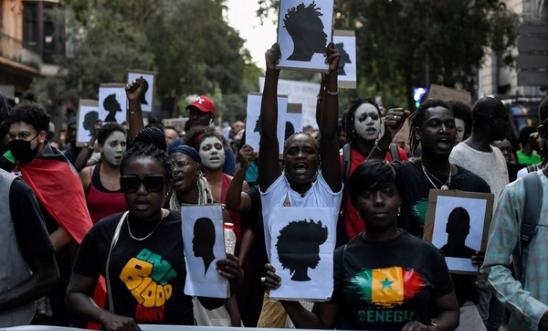
Press releases
Morocco/Spain: 'Deliberate cover up' of migrant carnage at Melilla border continues

At least 76 people still missing and 22 unidentified bodies still at a morgue in Morocco
Mounting evidence of crimes under international law by both Spanish and Moroccan governments at the Melilla border
‘One year on, the conclusion that we are facing a deliberate and concerted coverup is becoming harder to avoid’ - Agnès Callamard
Black people dehumanised at Europe’s borders
‘We are just immigrants, and we are human beings. We are not animals. We need respect like anyone’ - Aboubida from Sudan
Families of the dead and missing are trapped in limbo as their attempts to find out what happened to their loved ones and efforts to ensure justice, truth and reparation are being impeded in an apparent cover up by Spanish and Moroccan authorities, said Amnesty International on the eve of the first anniversary of the deadly events at the border of Spain’s Melilla enclave.
On 24 June last year, around 2,000 Sub-Saharan African migrants and refugees attempted to cross from Morocco to Spain - at least 37 people died, 76 are still missing and 22 bodies are still at a morgue in Morocco.
Authorities in Spain and Morocco have so far failed to conduct an effective independent investigation leaving scores of grieving families in anguish. Both authorities have failed to provide a full list of victim names and their causes of death as well as CCTV footage which could inform an investigation. In addition, they have failed to adequately investigate actions which constitute crimes under international law and human rights violations or to investigate racism and discrimination at the border.
Aboubida from Sudan who was beaten, tear gassed and denied medical assistance in Melilla, told Amnesty today:
“We are just immigrants and we are human beings. We are not animals. We need respect like anyone.”
Cover up by Spanish and Moroccan authorities
Spanish authorities refused to open an independent investigation and in December last year, prosecutors dropped their examination into the deaths saying that they found no evidence of criminal misconduct by Spanish security forces.
Moroccan authorities have not launched any investigation into the use of force by its border officials and have made it practically impossible for families and NGOs to carry out searches for the missing and dead.
Amnesty’s written requests to the Moroccan and Spanish governments asking them to share information, have so far gone unanswered.
Agnès Callamard, Amnesty International’s Secretary General, said:
“Spanish and Moroccan authorities not only continue to deny any responsibility but are preventing attempts to find the truth.
“Bodies are still lying in a morgue and in graves and efforts to identify the dead and inform their relatives have been blocked.
“As hopes of finding the missing 76 alive recede, the demand on the authorities to provide truth and ensure justice for the victims and their families is growing ever louder.
“What happened in Melilla is a reminder that racist migration policies have real and deadly consequences. It is hard to escape the racialised element of what happened in Melilla and the dehumanising way in which Black people are treated at Europe’s borders when they are living, missing or dead.
“One year on, the conclusion that we are facing a deliberate and concerted coverup is becoming harder to avoid. The lessons of Melilla must be learned or – as the shipwreck off the Greek coast shows – arbitrary loss of life, violence and impunity at borders will continue, and the suffering of people seeking protection, compounded.
“We demand an urgent and impartial investigation into the deaths in Melilla amid a growing mountain of evidence of serious and multiple human rights violations.”
Continued repression at the borders
Spanish authorities have continued conducting unlawful practices at borders, such as collective expulsions – often involving the excessive use of force.
At the Moroccan side of the border, and as a result of the cooperation between the two countries, Moroccan authorities continue preventing Black Sub-Saharan Africans from reaching Spanish territory where they could apply for asylum at the border.
Amnesty’s report last year found that the tragic events at the Melilla border were predictable and the loss of life avoidable.